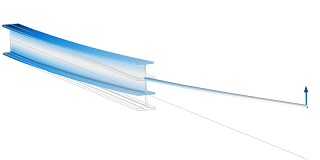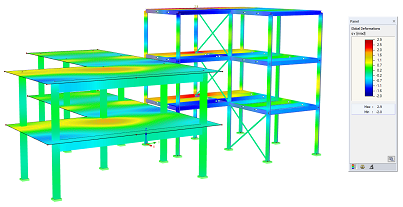CIV-E4010 - Finite Element Methods in Civil Engineering D, Lecture, 27.2.2023-26.4.2023
This course space end date is set to 26.04.2023 Search Courses: CIV-E4010
Topic outline
-
This course is one of the elective courses for the Advanced Studies or Elective Studies modules of the MSc program Building Technology.

Figure 1. An example from Comsol 5.3A release highlights: Coupling Beams and Solids.

Figure 2. An example from RFEM tutorials: Introduction to Analysis and Design.
START
First of all, students are asked to register to the course in the SISU-system.
The course starts on Tuesday the 28th of February at 14 with a lecture session. (Please note that in the academic system of ours at 14 means at 14.15 by default, whereas 14.00 is another thing.)
PEOPLETeacher-in-Charge: associate professor Jarkko Niiranen
Lecturers: associate professor Jarkko Niiranen and professor Antti Niemi (Week 6)
Assistants: post-doctoral researcher Youqi Zhang, doctoral student Tomi KankkunenLECTURES
Tuesdays 14--16 (in R266) and Thursdays 14--16 (in R2)
EXERCISES
Theoretical assignments: Wednesdays 14--16 (in R266) and Fridays 12--14 (in R5)
Computer assignments: Mondays 14--16 (in Maari E)Week 1: no Monday computer session
ACTIONS AND WORKLOADSIt should be noticed that more than 50% of the hours related to the "holy trinity" teaching--studying--learning is related to independent studying (reading and preparation 26%, home assignments 27%), whereas contact teaching covers the smaller complement (lectures 18%, exercise sessions 27%, examination 2%).
The following nominal hours (total 133) should guarantee for a student with average prerequisites (grade 3, good) middle range learning outcomes (with the average grade 3, good).
Lectures 18%:
- 2 double-hours per week (total 24)
- attending the lectures: pre-browsing, listening, writing notes, asking etc.
Reading 18%:
- 2 double-hours per week (total 24)
- self-studies: reading and writing the derivations in the lecture slides and/or textbook
Theoretical Exercise Sessions 18%:
- 2 double-hours per week (total 24)
- advice hours for theoretical hands-on exercises (given by the assistants)
Computer Exercises Sessions 9%:
- 1 double-hour per week (total 12)
- advice sessions for software hands-on exercises (given by the assistants)
Theoretical Home Assignments 18%:
- 4 hours per week (total 24) on top of the exercise sessions
- 3-6 per week
- self-studies for theoretical, hands-on exercises: problem solving, calculating, writing solution documents
Computer Home Assignments 9%:
- 2 hours per week (total 12) on top of the exercise sessions
- 1-3 per week
- self-studies for software, hands-on exercises: reading manuals, programming, modeling, preparing solution plots
Final Exam and Preparation 10%:
- 3 + 10 hours (total 13)EXAMS
The first examination of year 2023 is on April 18, the second one on June 8.
LEARNING OUTCOMES
1. Recognising possibilities, advantages and risks of applying advanced computational methods and simulation tools in engineering problems
2. Understanding of the theoretical foundations of the advanced finite element methods (FEM) applied in civil engineering
3. Understanding the main assumptions and features of specialized structural elements (such as beams, plates and shells) and analysis types (such as linear and nonlinear static, eigenvalue and time-dependent problems)
4. Ability to apply the most relevant advanced finite element methods in civil engineering by implementing well-structured programs for solving
basic engineering problems
5. Ability to critically utilize advanced finite element software tools (such as Comsol and/or RFEM/Scia/Robot/Abaqus) for the most typical civil engineering problems
